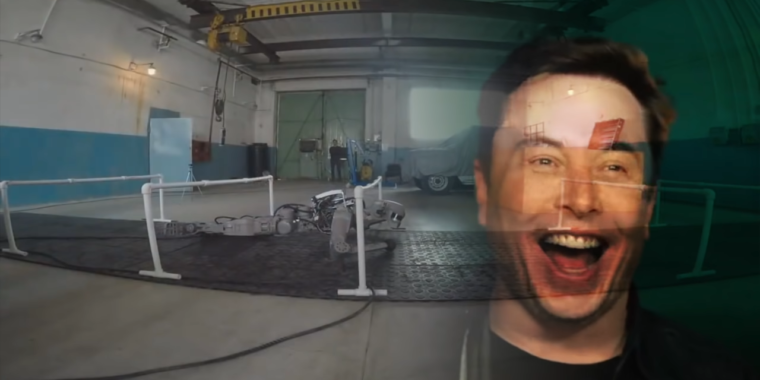
-
In a recent video, Russian opposition leader Alexei Navalny tackled corruption at Vostochny Spaceport.YouTube screenshot
-
At the center of this is the leader of Roscosmos, Dmitry Rogozin. From 2011 to 2018 he led the Russian defense ministry.YouTube screenshot
-
There are plenty of memes in the video.YouTube screenshot
-
Here, Rogozin is telling Russian President Vladmir Putin that a robot named “Fedor” will help Russia “conquer deep space.”YouTube screenshot
-
Fedor did not actually bring guns to space on a recent test flight.YouTube screenshot
-
The video then moves into a series of amusing shots of Fedor performing various tasks.YouTube screenshot
-
YouTube screenshot
-
YouTube screenshot
-
And a super-imposed Elon Musk is laughing at all of this apparently as he crushes the Russian space program with his low-cost rockets.YouTube screenshot
-
Documents that show the scope of Rogozin’s salary in 2018.YouTube screenshot
-
And the luxury vehicles he purchased for himself and his wife.YouTube screenshot
-
Rogozin and Fedor in the former’s Benz.YouTube screenshot
-
Also, here is Rogozin’s new dacha.YouTube screenshot
-
What’s that, a new gazebo under construction?YouTube screenshot
-
The point of all this, Navalny says, is that corruption in Russia begins at the very top.YouTube screenshot
Russia has a storied and capable space program. And following the space shuttle’s retirement in 2011, for nearly a decade, the country has safely and reliably provided a ride for US astronauts to get into space. But that does not mean the country’s space corporation, Roscosmos, is not riven with corruption.
A leading critic of Russian President Vladimir Putin, Alexei Navalny, recently turned his attention toward the country’s space program. In an entertaining 13-minute video not unlike those produced by “Last Week Tonight with John Oliver” on HBO, Navalny tackles corruption surrounding the construction of the Vostochny Spaceport in far-eastern Russia, as well as the apparently lavish lifestyle of Roscosmos leader Dmitry Rogozin. (The video is in Russian; it was translated for Ars by Robinson Mitchell. The English-language captions are mostly accurate.)
Vostochny troubles
At the outset of the video, Navalny notes that Putin has called for “transparency” surrounding the Vostochny project, which is mired in corruption and has led to a dozen criminal cases. The cost of the project has doubled from 150 billion rubles ($2.3 billion) to 300 billion rubles ($4.7 billion). Then Navalny zeroes in on the primary cause for these problems.
“Dear Mr. Putin, let me do one very simple thing for you,” Navalny says of the Vostochny spaceport and its corruption. “Since you started talking about transparency, and since you keep demanding it, I’ll point my finger at the very top, very close to you, Mr. President. Who’s in charge of it? Roscosmos. And who’s in charge of Roscosmos? The person you appointed, Dmitry Rogozin.”
Throughout the video, Navalny has several major lines of attack against Rogozin centering around his apparent self-dealing and wild-sounding statements. One of these is humorous. Navalny mocks the Russian robot named Fedor, which Rogozin has said will help Russia “conquer deep space.” This seems unlikely but makes for some amusing memes, in which even SpaceX founder Elon Musk makes an appearance.
Then the video turns more serious. First, using official documents, Navalny reports that Rogozin’s total salary in 2018 was 29.5 million rubles ($460,000), which is dramatically higher than engineers at Roscosmos make, which is about $10,000 a year. “Maybe that is what a man who wants to conquer deep space is supposed to make,” Navalny says of Rogozin’s salary. However, Roscosmos is so cash-strapped that some of its facilities cannot afford to remove the trash.
Navalny then compares Rogozin’s pay to NASA Administrator Jim Bridenstine’s salary of $185,000, and the average NASA engineer salary of about $80,000. This, he suggests, is a more equitable distribution of resources.
New cars and a dacha
Evidently Rogozin’s job has other perks. According to the documents, Rogozin has also purchased new vehicles: for himself, a Mercedes-Benz S560, and his wife, a Range Rover. Combined, these vehicles are valued at about $300,000. And then the Roscosmos chief also acquired an 8,600 sq. foot dacha north of Moscow worth about $3 million. And the documents appear to obscure even more gains, Navalny argues.
“We have nothing against large salaries,” Navalny says. “But why is it so insanely large? Is there really that much excess money in our budget? How can you demand transparency from the people at lower levels when at the very top the numbers in public access documents simply do not match?”
Rogozin has previously suggested naming the Vostochny spaceport after Putin. Navalny said this would be a great idea. “It’s a failed construction project whose construction took several years longer than promised,” Navalny says. “Its price has doubled in the process. Billions were stolen during construction. Of course it deserves to be named Vladimir Putin.”
Navalny’s criticisms of space and many other facets of Russia have had some effect on Russian public opinion in recent years, with growing unrest, especially among younger people. His central argument is that Putin sits at the head of a massive criminal organization plundering the wealth of Russia. It is not clear how much wealth will remain in the space industry after the Vostochny experience, the declining fortunes of the Proton rocket, and the imminent end of NASA paying for Russian Soyuz seats to the International Space Station.
Listing image by YouTube screenshot
https://arstechnica.com/?p=1626877

